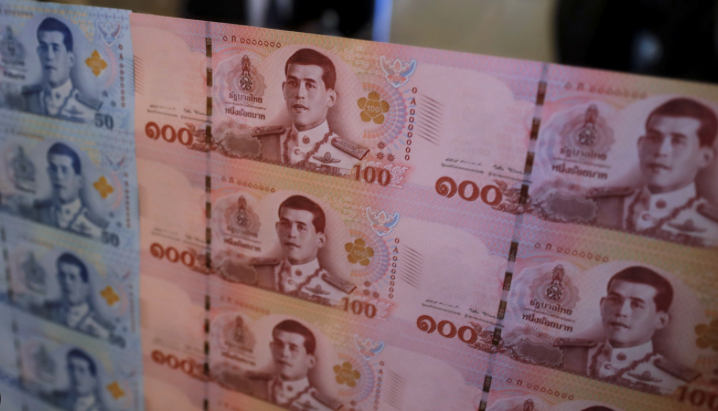The baht may strengthen beyond the significant psychological barrier of 33 to the dollar in the second quarter, following its rise to a six-month high yesterday, according to the Kasikorn Research Center (K-Research).
On Thursday morning, the Thai currency was quoted at 33.18-33.20 against the dollar, down from an overnight rate of 33.08, as noted by Kanjana Chockpisansin, head of research for banking and finance at the Kasikornbank think tank.
The recent appreciation of the baht aligns with movements in other Asian currencies as the dollar weakened due to a declining US economic outlook triggered by President Donald Trump’s announcement of reciprocal tariffs earlier this month.
Additionally, the rise in gold prices, which reached a record high of US$3,357.78 per ounce yesterday, has bolstered the baht, K-Research pointed out.
The dollar index, which measures the value of the US dollar against a basket of foreign currencies, has decreased by 8% this year, while the baht has appreciated by 2.4%, rising from 34.10 to the dollar at the end of 2024.
Ms. Kanjana highlighted that there has been a capital flight from the dollar toward other major currencies, particularly the yen and Swiss franc, which have appreciated by 10.2% and 11.1%, respectively, year-to-date.
“The baht is poised to rise beyond the critical threshold of 33 to the dollar this quarter if tensions between the US and major trading partners, especially China, continue or escalate. Such a scenario could lead to further weakening of the dollar,” she told the Bangkok Post.
As of April 16, foreign capital outflows from the Stock Exchange of Thailand for the year amount to 46.9 billion baht, compared to outflows of 148 billion for the entire 2024. However, the Thai bond market experienced inflows of 38.2 billion baht during this period, according to K-Research.
While expressing concerns that Trump’s tariffs could lead to a surge in US inflation, Federal Reserve Chair Jerome Powell indicated on Wednesday that the Fed would await more economic data before making any adjustments to interest rates. He noted the potential for a challenging situation where tariffs push prices higher while growth and the labor market might weaken, moving both inflation and employment away from the Fed’s desired levels.
“The market is beginning to speculate that if inflation rises due to Trump’s tariff policies, the Fed could consider reducing rates at its upcoming May 6-7 meeting, earlier than the previously anticipated cut in June,” Ms. Kanjana added.





